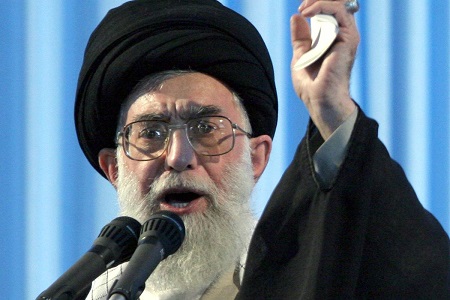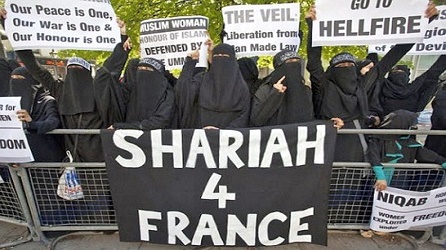While Democrats Busy with Demise of Trump Administration, European Union Struggles Against Iran
 The European Union finds itself in a politically delicate situation with regard to the continuation of recognizing the 2015 nuclear accord between Iran and and Western Nations. Within months of moving into the White House, President Donald Trump kept his promise to pull out of the Iranian deal in May 2017.
The European Union finds itself in a politically delicate situation with regard to the continuation of recognizing the 2015 nuclear accord between Iran and and Western Nations. Within months of moving into the White House, President Donald Trump kept his promise to pull out of the Iranian deal in May 2017.
Critics of the President Barack Obama/Secretary of State John Kerry Iranian deal from the start worried that the U.S. achieved nothing while the Iranians and their trade-partners gained much. The EU has shown the world that it is less willing to consider a return to economic sanctions, preferring to go back to nuclear talks with Tehran.
While the United States is in the midst of a “cold war’ with the Islamic dictatorship, the EU on Tuesday froze the assets of an Iranian intelligence unit and two of its staff. The action is allegedly a response to an incident in the Netherlands in which Iranian intelligence operatives killed two victims on Dutch soil and they, along with France and Denmark, accused Tehran of plotting more terrorist attacks in Europe, according to Homeland Security News Wire..
The legal action by Holland is viewed as a symbolic gesture since one of the men is already locked up in a detention center in Belgium. However, the government of The Netherlands marks its action as being the first time the EU has enacted sanctions on Iran since lifting a host of curbs on it three years ago following its controversial and weak 2015 nuclear pact with world powers. Except for President Obama and his cheerleaders in the news media and his own political party, very few observers considered the Iranian pact worth the paper it was written on. .
The Dutch decision includes designating the Iranian intelligence unit and the two Iranians as terrorists, follows last year’s disclosure by Denmark and France that they suspected an Iranian government intelligence service of pursuing assassination plots on their soil. Denmark’s government in Copenhagen sought an EU-wide response.
“EU just agreed to enact sanctions against an Iranian Intelligence Service for its assassination plots on European soil. Strong signal from the EU that we will not accept such behaviour in Europe,” Denmark’s Foreign Minister Anders Samuelsen said on the government’s Twitter account.

“France, which has already hit the two men and the ministry unit with sanctions, has said there was no doubt the Iranian intelligence ministry was behind a failed attack near Paris,” said Nicholas Peltier, an international military consultant and former officer with the infamous French Foreign Legion.
The letter signed by the Dutch foreign and interior ministers said Britain, France, Germany, Denmark, the Netherlands and Belgium met Iranian officials to convey “their serious concerns regarding Iran’s probable involvement in these hostile acts on EU territory.”
“Iran was informed that involvement in such matters is entirely unacceptable and must be stopped immediately … further sanctions cannot be ruled out,” the letter said.
Iran has denied any involvement in the alleged assassination plots, saying the accusations were only meant to damage EU-Iran relations.
Meanwhile in Paris, the government of President Emmanuel Jean-Michel Frédéric Macron accused Iran of a plot to carry out a bomb attack at a rally near Paris organized by an exiled Iranian opposition group. Denmark says it too foiled an Iranian intelligence plan to assassinate an Iranian Arab opposition figure on its soil.
On Tuesday, the Netherlands said it had “strong indications” that Iran was behind the assassinations of two Dutch nationals of Iranian origin, in 2015 and in 2017. The latter was dissident Iranian Arab activist Ahmad Mola Nissi who was gunned down by an unidentified assailant in front of his home in The Hague.

Iran denies any involvement in the killings.
The decision to impose the curbs was taken without debate at an unrelated meeting of Europe ministers in Brussels and the freezing of assets will begin Wednesday, according to EU officials.
Denmark’s Foreign Secretary named the two employees as the deputy minister and director general of intelligence, Saeid Hashemi Moghadam, and Assadollah Asadi, an Austrian-based diplomat. Their names are set to appear officially in the EU’s Official Journal on Wednesday.
Sanctions on the intelligence ministry, which is under the control of Iran’s Supreme Leader Ayatollah Ali Khamenei, are unlikely to change what the European Union says are Iran’s destabilizing activities in Europe and the Middle East.
Besides the Iranian military, the United States and European Union face the largest, best-equipped Islamic terrorist organization, the Shi’ite Hezbollah which is based in Lebanon and assisted the Syrian dictatorship in fending off the attacks of Sunni-based Islamic State of Iraq and Syria (ISIS) and Al-Nusra Front.
The deputy minister and director general of intelligence is in Iran, while the Iranian diplomat was charged and is being held by Belgian authorities. Neither appear to have assets in France, which first imposed the asset freeze late last year.


